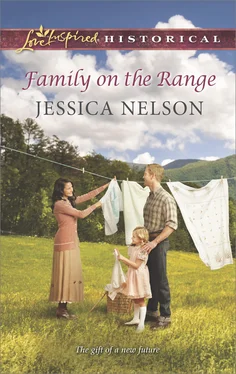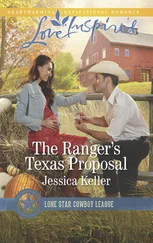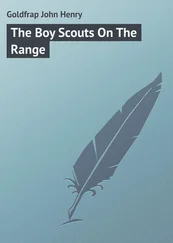Pivoting, he backed into the shadows. Shouts from down the road reached his hearing, but whoever had shot him took off. The sound of the shooter’s footsteps was distinctive, a smart uneven clip of metal against cobblestone. Almost like spurs.... The sound faded, merging with other, faster steps.
His shoulder burned. He groaned as the strength left his legs.
This was real bad. Worse than a shot in the leg or shoulder. Body numbing, he crumpled to the ground. He couldn’t keep his eyes open. The sounds around him muffled and the last image he saw was Mary’s dark eyes, the curve of her lips when she opened the door to welcome him home.
Would he see her again?
* * *
Loneliness never killed a person.
Or so Mary O’Roarke tried to tell herself as she mentally prepared for a visit with her mother. Surely once she stated her wishes, her mother would then see reason and quit insisting on living by herself.
Oregon’s summer sun rolled above Mary, hot though not quite to its zenith. She slowed her mare outside the Paiute encampment where her mother lived. Alone. With no one to rely on. It was not the way an elderly woman should live, and she’d told her mother so many times.
Only now did she have the means with which to help her, and no one could stop her, not even her stubborn employer who owned the ranch where she worked and, until recently, lived. She’d bought an old friend’s house next to the ranch, the first home she’d ever owned in all her thirty years, and maybe that might convince her mother to come back with her.
Feeling hopeful, Mary turned the horse in the direction of her mother’s dwelling.
The encampment consisted of tents and campfires. The odor of rabbit flesh hung in the air. The government did not appear to care that native Paiutes preferred homes made from various woods and sagebrush, and instead provided them with only the means to make tepees. Mary nodded to those she passed. Some wore the rabbit robes for which her mother’s people were known. Others, mostly men, dressed in the white man’s garb. Trousers, hats.
She came to her mother’s tepee and dismounted. No hitching post for her mare, so she tied the reins to a straggly shrub nearby. Children whispered and giggled, circling but not coming close. A stray dog loped over and the children chased it, their ill-fitting clothes doing nothing to hinder their laughter.
A wistful smile pulled at Mary’s lips. She’d longed to have children many years ago. Before the trauma of her past had wrenched her from any chance of a normal life. Perhaps she’d grown too old now, too set in her ways.... She certainly knew nothing about the ways of motherhood. Sighing, she bent near the entrance of her mother’s tent.
“It’s Mary. I’ve come to visit.”
A rustle ensued. Then the grunt that was Rose’s answer. Mary twisted the flap to the side and entered the tent. The interior never failed to elicit a strange sense of distance. This was her mother’s life now, a return to her roots, but it had never been Mary’s life. The setting filled her with disquiet and a peculiar sense of displacement.
As a child she’d lived in the white man’s world. Her father was Irish and while he worked the docks, her mother had used her beauty to bring in money at various brothels. It had been an odd childhood, full of travel and sporadic learning. When she was twelve, her father had abandoned them, followed shortly by her mother.
Tasting bitterness, Mary swallowed and prayed for peace.
“You brought me something?” Her mother sat to the side, high cheekbones cloaked with lined, leathery skin. The map of her broken life.
“Yes, willow and sagebrush bark.” She placed the offerings next to the stack of intricate baskets Rose weaved to sell.
They lapsed into awkward conversation. Mostly talk of weather.
“I have my own home,” she told her mother at last, warming to her subject. This was why she’d come. To coax Rose into living with her. At her mother’s look of surprise, Mary continued, “I’ve bought Trevor’s house. Now that he’s married, he plans to find a place in town for when he and Gracie don’t stay at the ranch. I would like you to come live with me.”
An old argument, but she tried again, hoping this to be the day her mother might surrender.
“Interesting,” Rose murmured, stroking the thick rabbit robe on her lap. “Now you will be alone with your employer?”
“Lou?”
“You have great besa soobedda for him.”
“A what?” Though Mary spoke some Paiute, she wasn’t fluent and disliked when her mother used language she hadn’t taught her only daughter.
A crooked smile lifted the corner of Rose’s lips. “Besa soobedda is love, the sweet emotional bond between a man and his wife.”
Mary stiffened as a peculiar heat seeped through her. She’d lived at the ranch for twelve years and never had she entertained such a thought about her employer. Granted, he was charming and funny. He had hired her as his housekeeper when she was eighteen, offering his home as a refuge after she’d been rescued from the notorious slave trader Mendez. Lou’s kindness would never be forgotten. But love?
“We have no such love,” she denied. “I feel a sister’s affection for him.” Even as she spoke, she wondered if that was true. When she’d told him goodbye yesterday, there had been the oddest regret creeping through her. Unnerved, she continued, “I should leave if you do not wish to come with me at this time.”
“Wait!” Her mother struggled to a standing position, and Mary tried not to cringe at how age and worries had stolen her mother’s strength. Perhaps loneliness would not kill her mother but rather another more obvious ailment. She swallowed hard at the thought.
Rose shuffled toward a trunk at the other side of the tepee. Bending, she opened it. “I have something for you.”
“I want you to come home with me. I need nothing else.”
“This is important.”
A small blond head popped up out of the trunk. “Hiya!”
Mary started. “What is that?”
“I’m a little girl.” The child clambered out of the trunk and gave Mary a decidedly mischievous smirk. “Are you going to be my mother?”
Startled, Mary groped for words. Finally, she said, “I’m not a mother to anyone.”
“Oh, but I need one. Just for a bit, you see, until I go home to my real mama.” The girl shot a cheeky, gap-toothed grin up at Rose, who reached down to stroke the girl’s head.
The movement snapped Mary from her shocked paralysis. “You have someone’s child? Do you know the penalty for such a thing?”
Rose met her accusation with a steady look. “She is in danger. You have a home apart from Lou now. You can hide her.”
“No.” She shook her head, feeling her braid swing against her back. “No, I can’t do it.”
“My daughter, I need you.” Her mother shuffled forward. “I cannot keep her much longer.”
Mary glanced at the child, who’d shifted her attention to the baskets and studiously went about picking one apart. “Who is she?”
“I don’t know.”
“My name’s Josie Silver,” the girl put in. “I live in Portland but my mama’s not home right now.”
“Where is she?” Mary asked. “How about your father?”
The girl lifted her shoulders. “I don’t know, and I don’t have a papa. I want to stay here.”
Mary glared at her mother. “Where did you find her?”
“Half-dead near Harney Lake, one week ago.”
She shuddered. “That’s horrible. You should’ve taken her to the authorities.”
Her mother grimaced. “I wasn’t supposed to be out there.”
“Mother.”
“Don’t berate me. You say you follow Jesus. A woman in town says He helps the poor and motherless. This child is that, and I—” Her mother peeked at the girl and lowered her voice. “I’m begging you to hide her until I send word it’s safe.”
Читать дальше












